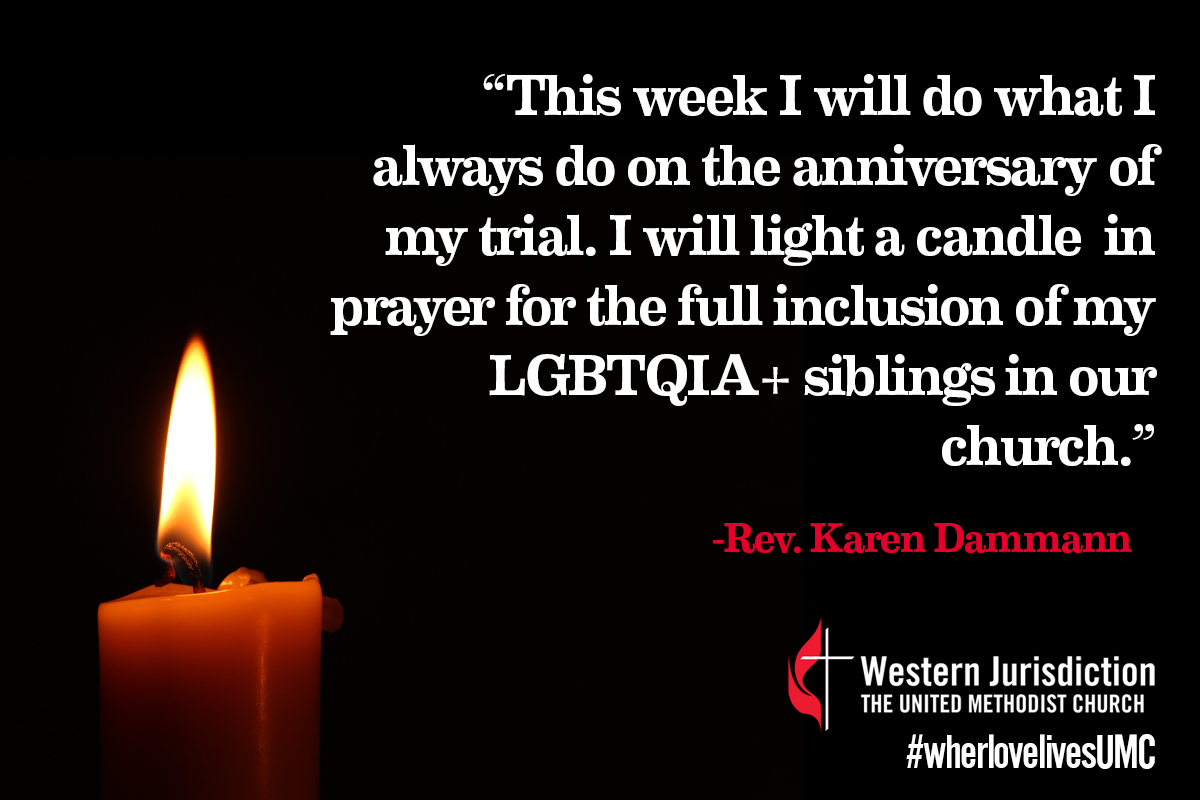Fair and equal ordination for all: “Was it worth it?” Recalling the trauma from going on trial as an LGBTQ+ clergy

As we continue our “Where Love Lives: Fair and Equal Ordination for All” storytelling project as part of the Western Jurisdiction campaign for a fully inclusive church, we hear from Rev. Karen Dammann, who this week 17 years ago was put on trial for “practices incompatible with Christian teaching” three years after disclosing to then-Pacific Northwest Conference Bishop Elias Galvan that she was a lesbian.
Her trial drew national media attention to a Sunday school classroom at Bothell UMC. She was acquitted by a 13-member board of her peers. But as you’ll read in her first-person account, Dammann still wonders if the scrutiny, the fear, the isolation and more were all worth it.
It was 17 years ago this week that my family and a team of supporters arrived at a church north of Seattle for the trial that was to determine whether I was guilty of “practices incompatible with Christian teaching”.
This trial came at the end of a three-year legal process that began in 2001 when I came out to my Bishop. Our child was two-and-a-half years old at that time and had just started to call me “Mama.” This normally exciting development was the point that required me to face the fact that the closet was no place to raise a child. We would not teach this innocent being – our child – to lie, and we could not expect our child to keep his family a secret.
I thought about surrendering my credentials when we decided to leave the closet, but the person who had become our pastor, Rev. John Auer, asked me if I was still called to the ministry. The answer was “yes.” With John’s support, and the help of his congregation, I was able to come out to my Bishop.
I knew there would be consequences for my choice, the main one being the loss of my vocation. We hoped that coming out of the closet, rather than quietly quitting, might help our denomination move toward full inclusion of LGBTQ+ persons. What we were not prepared for was the media scrutiny, estrangement from colleagues, and threats to our safety.
The Rev. Bob Ward and our legal team built a defense that included a broad slate of church experts who offered to testify for full inclusion in our denominational polity. For three days, we heard testimony that shined a light on our denomination’s unjust exclusive stance. This testimony made possible a “not guilty” verdict.
Bishop William Boyd Grove, presiding bishop, ended the trial by sealing the trial record, which effectively ended the possibility of sharing the expert testimony with the rest of the denomination.
In the years since I have asked several times to have the transcript released, not just for the Church, but for our child, who was the catalyst for being us being truthful about who his family is.
In 2018 I met Stephen Drachler (formerly of UM Communications, now a consultant) at a Reconciling Ministry Gathering. We spoke about the trial and he offered to approach Bishop Grove about releasing the transcript.
As a result of Stephen’s action, I received a letter from Bishop Grove in January of 2019 telling me that he and Bishop Elaine JW Stanovsky had agreed to release the transcript to me and to the public. (Thank you, Stephen!) Thank you also to Bishop Grove on behalf of the two-and-a-half year old, the 5-year-old and the now 22-year-old person I had hoped would have the transcript to read one day.
Last February (2020) Bishop Elaine told me the transcript had not been found in the PNW Office, even though, according to the provisions of the Book of Discipline, the transcript and all records of a trial shall be held in a special secure file by the Secretary of the Annual Conference.
That brings us to the present moment. I have been asked if it was worth it.
In many ways it was not worth it. When the transcript and the information that it contained was sealed, the hope that the cost of my coming out would help our denomination to see a way to include everyone slipped away. The danger and threats that our family experienced was never worth it. Sadly, our denomination continues to officially exclude from full participation LBGTQIA+ people. We are now in limbo waiting for the church to split over the issue. What difference did it make after all?
On the other hand, was it worth it? In some ways it was. The Greater Northwest has become a place of full inclusion for LGBTQIA+ persons. Maybe the trial did make a difference, even just a little bit, in the GNW becoming safer than many other places in the denomination.
A not-guilty verdict, and remaining in good standing, was an unexpected outcome for me. It was worth it personally for that determination.
Even though the threats we received convinced us to disappear for a while to keep our family safe after the trial, I longed for the day I could come back to work. In 2012 I was appointed by Bishop Grant Hagiya to serve a church in Alaska. I am in my ninth year of ministry here.
Seventeen years later some things have changed for the better. Many things have not. I still want to be able to hand a copy of the trial transcript to my son. Maybe someone reading this knows where it is.
This week, I will do what I always do on the anniversary of my trial. I will light a candle in prayer for the full inclusion of my LGBTQIA+ siblings in our church. I have hope that whatever emerges in the year ahead, there will be a denomination that is fully inclusive of everyone.
Rev. Karen Dammann is an ordained elder in the PNW Conference, currently serving United Methodist churches in the Alaska Conference.
